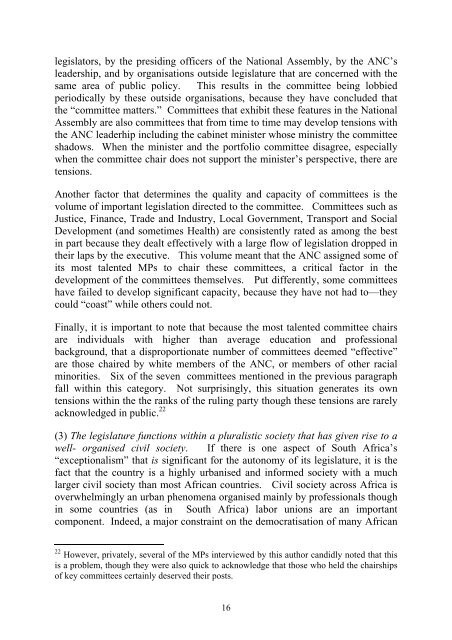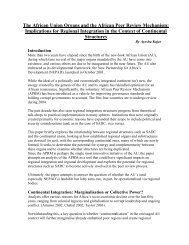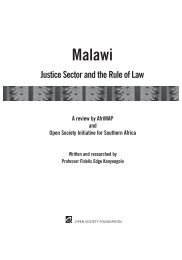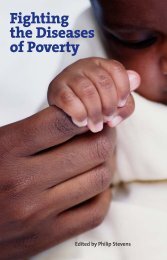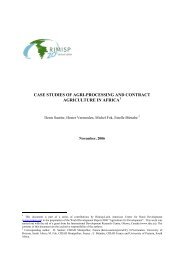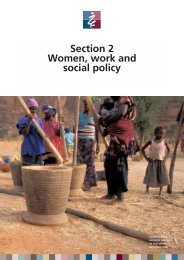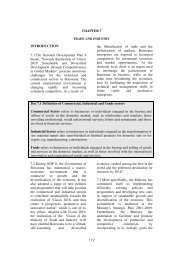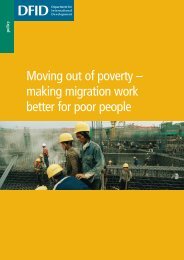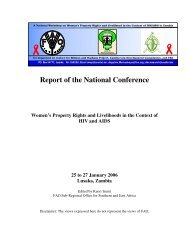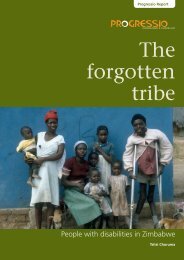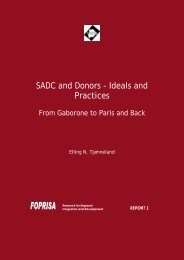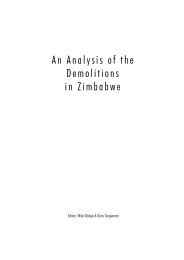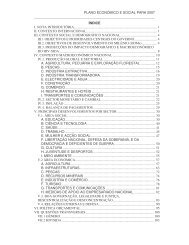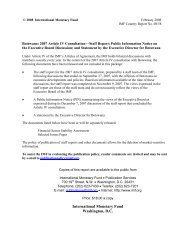400Kb ~ 2 min (33 pages) - SARPN
400Kb ~ 2 min (33 pages) - SARPN
400Kb ~ 2 min (33 pages) - SARPN
You also want an ePaper? Increase the reach of your titles
YUMPU automatically turns print PDFs into web optimized ePapers that Google loves.
legislators, by the presiding officers of the National Assembly, by the ANC’sleadership, and by organisations outside legislature that are concerned with thesame area of public policy. This results in the committee being lobbiedperiodically by these outside organisations, because they have concluded thatthe “committee matters.” Committees that exhibit these features in the NationalAssembly are also committees that from time to time may develop tensions withthe ANC leaderhip including the cabinet <strong>min</strong>ister whose <strong>min</strong>istry the committeeshadows. When the <strong>min</strong>ister and the portfolio committee disagree, especiallywhen the committee chair does not support the <strong>min</strong>ister’s perspective, there aretensions.Another factor that deter<strong>min</strong>es the quality and capacity of committees is thevolume of important legislation directed to the committee. Committees such asJustice, Finance, Trade and Industry, Local Government, Transport and SocialDevelopment (and sometimes Health) are consistently rated as among the bestin part because they dealt effectively with a large flow of legislation dropped intheir laps by the executive. This volume meant that the ANC assigned some ofits most talented MPs to chair these committees, a critical factor in thedevelopment of the committees themselves. Put differently, some committeeshave failed to develop significant capacity, because they have not had to—theycould “coast” while others could not.Finally, it is important to note that because the most talented committee chairsare individuals with higher than average education and professionalbackground, that a disproportionate number of committees deemed “effective”are those chaired by white members of the ANC, or members of other racial<strong>min</strong>orities. Six of the seven committees mentioned in the previous paragraphfall within this category. Not surprisingly, this situation generates its owntensions within the the ranks of the ruling party though these tensions are rarelyacknowledged in public. 22(3) The legislature functions within a pluralistic society that has given rise to awell- organised civil society. If there is one aspect of South Africa’s“exceptionalism” that is significant for the autonomy of its legislature, it is thefact that the country is a highly urbanised and informed society with a muchlarger civil society than most African countries. Civil society across Africa isoverwhel<strong>min</strong>gly an urban phenomena organised mainly by professionals thoughin some countries (as in South Africa) labor unions are an importantcomponent. Indeed, a major constraint on the democratisation of many African22 However, privately, several of the MPs interviewed by this author candidly noted that thisis a problem, though they were also quick to acknowledge that those who held the chairshipsof key committees certainly deserved their posts.16


